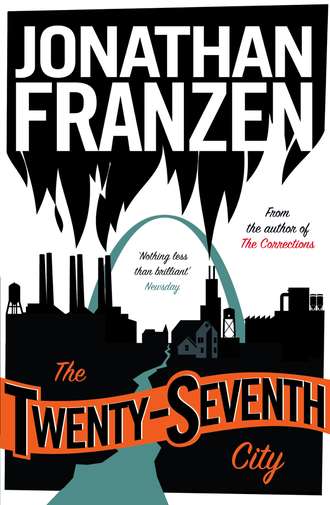
Полная версия
The Twenty-Seventh City
She woke up with a shudder.
Jammu’s father had been killed in 1974 when a helicopter carrying foreign journalists and some South Vietnamese military personnel was downed near the Cambodian border by a communist rocket. A second helicopter captured the crash on film before escaping to Saigon. Jammu and her mother had learned the news from the Paris edition of the Herald Tribune, their sole link with the man. It was from a week-old Herald Tribune that Jammu, more than a decade earlier, had first learned his name. Ever since she’d been old enough to ask, her mother had evaded her questions, dismissing the subject brusquely whenever Jammu tried to bring it up. Then, in the spring before she entered the university, her mother spoke. They were at the breakfast table on the veranda, Maman with her Herald Tribune and Jammu with her algebra book. Her mother nudged the paper across the table and scraped a long fingernail across an article at the bottom of the front page:
TENSION MOUNTS ON
SINO-INDIAN BORDER
Peter B. Clancy
Jammu read a few paragraphs, but she didn’t know why. She looked up for an explanation.
“That’s your father.”
The tone was typically matter-of-fact. Maman spoke only English to Jammu, and spoke it with a perverse disdain, as if she didn’t accept the language’s word for anything. Jammu scanned the article again. Countercharges. Secessionist. Bleak vistas. Peter B. Clancy. “A reporter?” she said.
“Mm.”
Her mother wouldn’t say what he was like. Having acknowledged his existence, she proceeded to ridicule her daughter’s curiosity. There was no story to tell, she said. They’d met in Kashmir. They’d left the country and spent two years in Los Angeles, where Clancy took a degree of some sort. Then Maman had returned, alone, to Bombay, not Srinagar, with her baby, and had lived there ever since. Nowhere in this obituary narrative did she suggest that Clancy was anything more than a second set of luggage. Jammu got the idea—things hadn’t worked out. It didn’t matter, either. The city was full of bastards, and Maman, in any case, was oblivious to public opinion. The newspapers called her the “laughing jackal of real estate.” Laughing all the way to the bank, they meant. She was a speculator and slumlord, one of the more successful in a town of speculation and slums.
Jammu selected two Tylenols and a Dexedrine from her top drawer and swallowed them with coffee dregs. She’d finished the night’s reading sooner than she’d planned. It was only 6:30. In Bombay it was 5:00 in the evening—Indian time was a quaint half hour out of step with the rest of the world—and Maman was probably at home, upstairs, pouring her first drink. Jammu reached for the phone, got the international operator, and gave her the numbers.
The connection hissed with the difficult spanning of half a world. Of course in India even local calls hissed this way. Maman answered.
“It’s me,” Jammu said.
“Oh, hello.”
“Hello. Are there any messages?”
“No. The town seems empty without your friends.” Her mother laughed. “Homesick?”
“Not especially.”
“Apropos—has the Enlightened Despot called you?”
“Ha ha.”
“Seriously. She’s in New York. The U.N. General Session opened.”
“That’s a thousand miles from here.”
“Oh, she could afford to call. She chooses not to. Yes. She simply chooses not to. I read this morning—do you still read the papers?”
“When I have time.”
“That’s right. When you have time. I read about her mini-summit with American intellectuals is what I was going to say. Front page, column one. Asimov, Sagan—futurists. She’s a wonder. Study her and you can learn. Not that she’s infallible. I noticed Asimov was eating ribs in the picture they ran. But anyway – How is St. Louis?”
“Temperate. Very dry.”
“And you with your sinuses. How is Singh?”
“Singh is Singh. I’m expecting him any minute.”
“Just don’t let him handle your accounts.”
“He’s handling my accounts.”
“Willful child. I’ll have to send Bhandari over later this month to check the arrangements. Singh is not—”
“Here? You’re sending Karam here?”
“Only for a few days. Expect him on the twenty-ninth or so.”
“Don’t send Karam. I don’t like him.”
“And I don’t like Singh.” There was a faint sound that Jammu recognized as the rattle of ice in a tumbler. “Listen dear, I’ll talk to you tomorrow.”
“All right. Good-bye.”
Maman and Indira were blood relations, Kashmiri Brahmans, sharing a great-grandfather on the Nehru side. It was no coincidence that Jammu had been admitted to the Indian Police Service less than a year after Indira became prime minister. Once she was in the Service, no one had been ordered to promote her, of course, but occasional phone calls from the Ministry would let the pertinent officials know that her career was being watched “with interest.” Over the years she herself had received hundreds of calls similar in their vagueness, though more immediate in their concerns. A Maharashtra state legislator would express great interest in a particular prosecution, a Congress Party boss would express great distress over a particular opponent’s business dealings. Very seldom did a call originate from higher up than the governor’s office; Indira was a great student of detail, but only in curricular subjects. Like any entrenched leader, she made sure to place plenty of buffers between herself and questionable operations, and Jammu’s political operations had been questionable at best. The two of them had spoken privately only once—just after Jammu and her mother concocted Project Poori. Jammu flew to Delhi and spent seventy minutes in the garden of Madam’s residence on Safdarjang Road. Madam, in a canvas chair, watched Jammu closely, her brown eyes protuberant and her head turned slightly to one side, her lips curled in a smile that now and then made her gums click, a smile in which Jammu saw nothing but machinery. Shifting her gaze a quarter turn, towards a hedge of rosebushes behind which machine-gun muzzles sauntered, Madam spoke. “Please understand that this wholesaling project won’t work. You do understand that, you’re a sensible young woman. But we’re going to fund it anyway.”
A shoe squeaked in Jammu’s outer office. She sat up straight. “Who’s—” She cleared her throat. “Who’s there?”
Balwan Singh walked in. He was wearing pleated gray pants, a fitted white shirt, and an azure necktie with fine yellow stripes. His air was so competent and trustworthy that he scarcely needed to show his clearance papers to get upstairs. “It’s me,” he said. He set a white paper bag on Jammu’s desk.
“You were eavesdropping.”
“Me? Eavesdropping?” Singh walked to the windows. He was tall and broad-shouldered, and his light skin had received additional sunniness from some Middle Eastern ancestor. Only an old friend and ex-lover like Jammu could detect the moments when the grace of his movements passed over into swishiness. She still admired him as an ornament. For a man who up until July had been living in Dharavi squalor, he would have seemed remarkably—suspiciously—dapper if he hadn’t dressed exactly the same way among his so-called comrades in Bombay, whose tastes ran to velour and Dacron and sleazy knits. Singh was a marxist of the aesthetic variety, attracted to the notion of exportable revolution at least partly because Continental stylishness was exported along with it. His haberdasher was located on Marine Drive. Jammu had long suspected he’d forsaken Sikhism as a youth because he considered a beard disfiguring.
Singh nodded at the paper bag on her desk. “There’s some breakfast if you want it.”
She placed the bag on her lap and opened it. Inside were two chocolate doughnuts and a cup of coffee. “I was listening to some tapes,” she said. “Who put the mikes in the St. Louis Club bathrooms?”
“I did.”
“That’s what I thought. Baxti’s mikes sound like they’re wrapped in chewing gum. Yours do pretty well. I heard some useful exchanges. General Norris, Buzz Wismer—”
“His wife is a terrible bitch,” Singh said absendy.
“Wismer’s?”
“Yes. ‘Bev’ is the name. Of all the women here who will never forgive Asha for marrying Sidney Hammaker, or Hammaker for marrying Asha—and there are a great many of these women—Bev is the nastiest.”
“I’ve been hearing the same complaints on all the tapes,” Jammu said. “At least from the women. The men are more likely to say they’re ‘ambivalent’ about Asha. They keep referring to her intelligence.”
“Meaning her bewitching beauty.”
“And her fabulous wealth.”
“Wismer, at any rate, is one of the ambivalent ones. Bev can’t stand it. She taunts him constantly.”
Jammu dropped the lid from her coffee cup into the wastebasket. “Why does he put up with it?”
“He’s strange. A shy genius.” Singh frowned and sat down on the windowsill. “I started hearing about Wismer jets twenty years ago. Nobody makes a better one.”
“So?”
“So he isn’t the man I expected. The voice is all wrong.”
“You’ve been doing a lot of listening.”
“A hundred fifty hours maybe. What do you think I do all day?”
Jammu shrugged. She could be certain Singh wasn’t exaggerating the amount of time he’d spent on the job. He was studiously beyond reproach. With no distractions (except for an occasional blond boy) and no responsibilities (except to her), he had time to lead an ordered life. A precious life. She, who had a pair of jobs that each took sixty hours a week to perform, was no match for Singh when it came to details. Her foot began to tap of its own accord, which meant the Dexedrine was working. “I’m taking you off the Wismer case,” she said.
“Oh yes?”
“I’m putting you in charge of Martin Probst.”
“All right.”
“So you’re going to have to start all over. You can forget Wismer, forget your hundred fifty hours.”
“That was just the tapes. Try three hundred.”
“Baxti handed in Probst’s file. You start immediately.”
“Is this something you only just decided?”
“No, it is not. I already spoke to Baxti, he already handed in his file, that’s what you’re here for. To pick it up.”
“Fine.”
“So pick it up.” She nodded at a tea-stained folder by her desk lamp.
Singh walked to the desk and picked it up. “Anything else?”
“Yes. Put the file down.”
He put it down.
“Go get me a glass of water and turn up the heat in here.”
He left the room.
Martin Probst was the general contractor whose company had built the Gateway Arch. He was also chairman of Municipal Growth Inc., a benevolent organization consisting of the chief executives of the St. Louis area’s major corporations and financial institutions. Municipal Growth was a model of efficacy and an object of almost universal reverence. If someone needed sponsors for an urban renewal project, Municipal Growth found them. If a neighborhood opposed the construction of a highway, Municipal Growth paid for an impact study. If Jammu wanted to alter the power structure of metropolitan St. Louis, she had to contend with Municipal Growth.
Singh returned with a Dixie cup. “Baxti is looking for new worlds to conquer?”
“Get a chair and sit down.”
He did so.
“Baxti’s obviously only marginally competent, so why make an issue of it?”
He shook a clove cigarette from a caramel-colored pack and struck a match, shielding the flame from a hypothetical breeze. “Because I don’t see why we’re switching.”
“I guess you’ll just have to trust me.”
“Guess so.”
“I assume you know the basics already—Probst’s charming wife Barbara, their charming eighteen-year-old daughter Luisa. They live in Webster Groves, which is interesting. It’s wealthy but hardly the wealthiest of the suburbs. There’s a gardener who lives on the property, though… Baxti terms their home life ‘very tranquil.’ “
“Mikes?”
“Kitchen and dining room.”
“The bedroom would have been more telling.”
“We don’t have that many frequencies. And there’s a TV in the bedroom.”
“Fine. What else?”
Jammu opened the Probst file. Baxti’s Hindi scrawl made her blink. “First of all, he only uses non-union labor. There was a big legal fight back in the sixties. His chief attorney was Charles Wilson, Barbara’s father, now his father-in-law. That’s how they met. Probst’s employees have never been on strike. Union wages or better. Company insurance, disability, unemployment and retirement plans, some of which are unique in the business. It’s paternalism at its best. Probst isn’t any Vashni Lai. In fact he has a quote reputation unquote for personal involvement at all levels of the business.”
“An eye to the personal.”
“Ha ha. He’s currently chairman of Municipal Growth, term to run through next June. That’s important. Beyond that—Zoo Board member ’76 through present. Board member Botanical Gardens, East-West Gateway Coordinating Council. Sustaining membership in Channel 9. That isn’t so important. Splits his ticket, as they say. Baxti did some interesting fieldwork. Went through old newspapers, spoke with the man in the street—”
“I wish I’d seen it.”
“His English is improving. It seems the Globe-Democrat sees Probst as a saint of the American Way, rags to riches, a nobody in 1950, built the Arch in the sixties, along with the structural work on the stadium, and then quite a list of things. That’s also very significant.”
“He spreads himself thin.”
“Don’t we all.”
Singh yawned. “And he’s really that important.”
“Yes.” Jammu squinted in the clove smoke. “Don’t yawn at me. He’s first among equals at Municipal Growth, and they’re the people we’re working on if we want capital moving downtown. He’s nonpartisan and Christ-like in his incorruptibility. He’s a symbol. Have you been noticing how this city likes symbols?”
“You mean the Arch?”
“The Arch, the Veiled Prophet, the whole Spirit of St. Louis mythos. And Probst too, apparently. If only for the votes he’ll bring, we need him.”
“When did you decide all this?”
Jammu shrugged. “I hadn’t given him much thought until I spoke with Baxti last week. He’d just eliminated Probst’s dog, a first step towards putting Probst in the State—”
“The State, yes.”
“—although at this point it’s little more than bald terrorism. For what it’s worth, the operation was very neat.”
“Yes?” Singh removed a speck of cigarette paper from his tongue, looked it over, and flicked it away.
“Probst was out walking the dog. Baxti drove by in a van, and the dog chased him. He’d found a medical supply company that sold him the essence of a bitch in heat. He soaked a rag in the stuff and tied the rag in front of his rear axle.”
“Probst wasn’t suspicious?”
“Apparently not.”
“What’s to stop him from buying another dog?”
“Presumably Baxti would have arranged something for the next one too. You’ll have to rethink the theory here. One reason I’m giving you Probst is he didn’t seem to respond to the accident.”
The phone rang. It was Randy Fitch, the mayor’s budget director, calling because he’d be late for his eight o’clock appointment, due to his having overslept. In a sweet, patient tone, Jammu assured him that she wasn’t inconvenienced. She hung up and said, “I wish you wouldn’t smoke those things in here.”
Singh went to the window, opened it, and tossed the butt into the void. Faint river smells entered the room, and down below on Tucker Boulevard a bus roared into the Spruce Street intersection. Singh was orange in the sunlight. He seemed to be viewing a titanic explosion, coldly. “You know,” he said, “I was almost enjoying the work with Buzzy and Bevy.”
“I’m sure you were.”
“Buzz considers Probst and his wife good friends of his.”
“Oh?”
“The Probsts put up with Bev. I have the impression they’re ‘nice’ people. Loyal.”
“Good. A pretty challenge for you.” Jammu placed the file in Singh’s hands. “But nothing fancy, you understand?”
Singh nodded. “I understand.”
2
In 1870 St. Louis was America’s Fourth City. It was a booming rail center, the country’s leading inland port, a wholesaler for half a continent. Only New York, Philadelphia and Brooklyn had larger populations. Granted, there were newspapers in Chicago, a close Fifth, that claimed the 1870 census had counted as many as 90,000 nonexistent St. Louisans, and granted, they were right. But all cities are ideas, ultimately. They create themselves, and the rest of the world apprehends them or ignores them as it chooses.
In 1875, with local prophets casting it as the nation’s natural capital, the eventual First City, St. Louis undertook to remove a major obstacle from its path. The obstacle was St. Louis County, the portion of Missouri to which the city nominally belonged. Without the city, St. Louis County was nothing—a broad stretch of farmland and forest in the crook of two rivers. But for decades the county had dominated city affairs by means of an archaic administrative body called the County Court. The Court’s seven “judges” were notoriously corrupt and insensitive to urban needs. A county farmer who wanted a new road built to his farm could buy one cheap for cash or votes. But if parks or streetlights were needed for the city’s common good, the Court had nothing to offer. To a young frontier town the Court’s parochialism had been frustrating; to the Fourth City, it was intolerable.
A group of prominent local businessmen and lawyers persuaded the framers of a new Missouri state constitution to include provisions for civic reform. Despite harassment by the County Court, the group then drafted a scheme for the secession of St. Louis from St. Louis County, to be voted on by all county residents in August 1876.
Pre-election criticism focussed on one element of the scheme in particular: the expansion of the city’s landholdings, in a kind of severance payment, from the current twenty-one square miles to sixty-one square miles. Countyites objected to the city’s proposed “theft” of county property. The Globe-Democrat denounced the unfairness of annexing “divers and sundry cornfields and melon patches and taxing them as city property.” But the scheme’s proponents insisted that the city needed the extra room for tomorrow’s parks and industry.
In an election run by the County Court, voters narrowly rejected the secession scheme. There were cries of fraud. Activists had no trouble convincing a Circuit Court judge (one Louis Gottschalk, who had personally drafted the reform provisions for the 1875 constitution) to appoint a commission to investigate the election. In late December the commissioners reported their findings. The scheme had passed after all, by 1,253 votes. Immediately the city claimed its new land and adopted a new charter, and five months later the County Court, its appeals exhausted, dissolved itself.
Time passed. Sixty-one square miles of land soon proved to be less ample than the secessionists had supposed. As early as 1900 the city was running out of space, and the county refused to give it more. Old industry fled the messes it had made. New industry settled in the county. In the thirties, poor black families arrived from the rural South, hastening the migration of whites to the suburbs. By 1940 the city’s population had begun to plummet, and its tax base to shrink. Stately old neighborhoods became simply old. New housing projects like Pruit-Igoe, begun in the fifties, failed spectacularly in the sixties. Efforts at urban renewal succeeded in attracting affluent county residents to a few select zones but did little to cure the city’s ills. Everyone worried about the city’s schools, but it was an exercise in hand wringing. The seventies became the Era of the Parking Lot, as acres of asphalt replaced half-vacant office buildings downtown.
By now, of course, most American cities were in trouble. But compared with St. Louis, even Detroit looked like a teeming metropolis, even Cleveland like a safe place to raise a family. Other cities had options, good neighbors, a fighting chance. Philadelphia had land to work with. Pittsburgh could count on help from Allegheny County. Insular and constricted, St. Louis had by 1980 dwindled to America’s Twenty-Seventh City. Its population was 450,000, hardly half the 1930 figure.
The local prophets were defensive. Where once they’d expected supremacy, they now took heart at any sign of survival. For forty years they’d been chanting: “St. Louis is going to make it.” They pointed to the Gateway Arch. (It was 630 feet tall; you couldn’t miss it.) They pointed to the new convention center, to three tall new buildings and two massive shopping complexes. To slum-clearance projects, to beautification programs, to plans for a Gateway Mall that would rival the mall in Washington.
But cities are ideas. Imagine readers of The New York Times trying in 1984 to get a sense of St. Louis from afar. They might have seen the story about a new municipal ordinance that prohibited scavenging in garbage cans in residential neighborhoods. Or the story about the imminent shutdown of the ailing Globe-Democrat. Or the one about thieves dismantling old buildings at a rate of one a day, and selling the used bricks to out-of-state builders.
Why us?
Never conceding defeat, the prophets never asked. Nor did the old guiding spirits, whose good intentions had doomed the city; they’d moved their homes and operations to the county long ago. The question, if it arose at all, arose in silence, in the silence of the city’s empty streets and, more insistently, in the silence of the century separating a young St. Louis from a dead one. What becomes of a city no living person can remember, of an age whose passing no one survives to regret? Only St. Louis knew. Its fate was sealed within it, its special tragedy special nowhere else.
After his meeting with Jammu, Singh took the heavy Probst file to his West End apartment, read the file’s contents, called Baxti eight times for clarifications, and then, the following morning, drove out to Webster Groves for a visit to the scene of future crimes.
The Probsts lived in a three-story stucco house on a long, broad street called Sherwood Drive. Barbara Probst had driven off punctually. Tuesdays, like Thursdays, she worked in the acquisitions department of the St. Louis University Library, returning home at 5:30. Tuesday was also the gardener’s day off. When the beeping in Singh’s earphone had faded into static (Baxti had equipped Barbara’s BMW with a transmitter that had a range of one kilometer) he checked the two channels from the mikes inside the house and, finding everything quiet, approached on foot. During school hours pedestrians were as scarce on Sherwood Drive as in a cemetery.
Singh was dressed approximately like a gas-meter reader. He carried a black leather shoulder bag. Ready in his pocket were surgical latex gloves for fingerprint protection. He descended the rear stairs and entered the basement with the key Baxti had given him. Looking around, he was impressed by the great quantity of junk. In particular, by the many bald tires, the many plastic flower pots, and the many coffee cans. He went upstairs to the kitchen. Here the air had the smell of recent redecoration, the composite aroma of new wallpaper, new fabrics, new caulking and new paint. A dishwasher throbbed in its drying cycle. Singh removed the screen from the heating register above the stove, replaced the battery in the transmitter, adjusted the gain of the mike (Baxti never failed not to do so), replaced the screen, and repeated the procedure for the transmitter in the dining room.
Baxti had already gone through Probst’s study and Barbara’s desk and closets, the address books and cancelled checks and old correspondences, so Singh concentrated on the girl’s—Luisa’s – bedroom. He shot up six feet of microfilm, recording every document of interest. It was noon by the time he finished. He mopped his forehead with his shirtsleeve and opened a bag of M&M’s (they didn’t leave crumbs). He was chewing the last of them, two yellow ones, when he heard a familiar voice outside the house.








